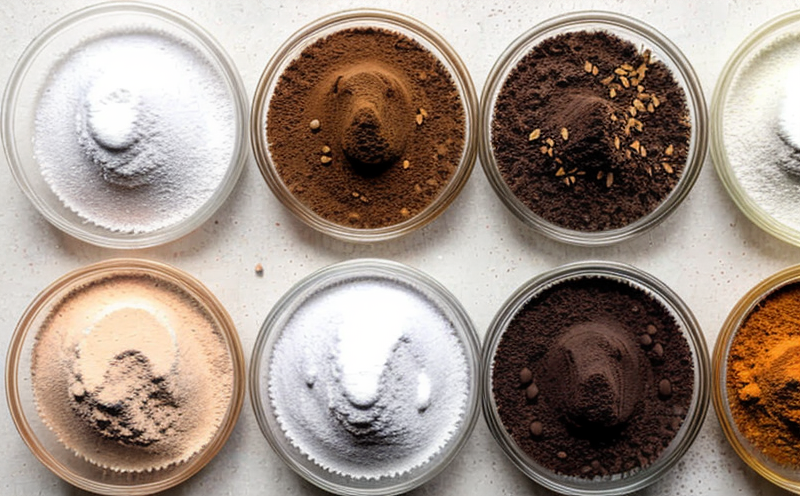ISO 7345 Stevia Glycoside Detection in Beverages
The detection and quantification of stevia glycosides in beverages is critical for manufacturers to ensure compliance with global regulatory requirements. The ISO 7345 standard provides a standardized method for the determination of total stevioside content, which includes both stevioside (ST) and rebaudioside A (REB-A), two primary sweetening components extracted from the leaves of the Stevia rebaudiana plant.
Stevia has gained significant popularity due to its zero-calorie profile, making it an attractive ingredient for manufacturers seeking to develop low-sugar or sugar-free products. However, to ensure product consistency and regulatory compliance, accurate analysis is necessary. The ISO 7345 method employs high-performance liquid chromatography (HPLC) coupled with diode-array detection (DAD), which allows for precise quantification of the sweetening components.
The process begins with a meticulous sample preparation step where the beverage is filtered and diluted to ensure accurate analysis. The HPLC system, equipped with specific column packing materials optimized for stevia glycoside separation, ensures reliable results. Calibration standards are prepared using pure compounds of ST and REB-A, ensuring that the method's linearity and accuracy meet stringent criteria.
The standard also outlines acceptance criteria to ensure that the detected values fall within acceptable ranges for compliance with international regulations. Compliance is crucial in markets like Europe, where stringent labeling requirements mandate accurate disclosure of all ingredients used in food products. The method's robustness allows laboratories to reliably detect even trace amounts of these components, ensuring that formulations remain compliant.
In addition to the detection of total stevioside content, the ISO 7345 standard also addresses the quantification of individual glycosides, which can vary based on processing methods and extraction techniques. This detailed analysis is essential for R&D teams looking to optimize production processes or formulate new products with specific sweetness profiles.
The standardized approach provided by ISO 7345 ensures that results are comparable across different laboratories worldwide, facilitating global trade and ensuring consumer confidence in product labeling accuracy. For manufacturers, this translates into reduced risk of non-compliance penalties and enhanced market reputation.
The method's precision is particularly important for quality managers and compliance officers responsible for maintaining regulatory adherence. By leveraging ISO 7345, they can ensure that their products meet the stringent requirements set by global standards bodies such as Codex Alimentarius and national food safety authorities.
Benefits
Detecting stevia glycosides in beverages using ISO 7345 offers several key benefits:
Enhanced compliance with international standards for labeling and ingredient disclosure.
Precision in quality control, ensuring consistent product sweetness across batches.
Accurate formulation optimization to meet specific sweetness targets without compromising product integrity.
Reduction of risk associated with non-compliance penalties and legal challenges.
Increased market competitiveness by demonstrating adherence to global best practices in ingredient analysis.
These benefits contribute significantly to the reputation and success of food and beverage manufacturers, ensuring they meet consumer expectations while adhering to regulatory requirements.
Industry Applications
Food Manufacturing: Ensuring that products labeled as stevia-sweetened contain accurate levels of sweetening components.
Beverage Industry: Verification of ingredient content in low-calorie and sugar-free beverages.
R&D Laboratories: Optimizing formulation processes to achieve desired sweetness profiles without excess or deficiency of ingredients.
Quality Control Departments: Monitoring production batches for compliance with labeling claims.
The application of ISO 7345 is widespread across the food and beverage sector, particularly in areas focusing on natural sweeteners and health-conscious product development. Its role is pivotal in maintaining consumer trust and regulatory compliance.
Eurolab Advantages
At Eurolab, we offer unparalleled expertise in the detection of stevia glycosides using ISO 7345:
Accurate and reliable results through state-of-the-art HPLC-DAD instrumentation.
Comprehensive support for all aspects of sample preparation and analysis.
Experienced technicians with in-depth knowledge of the ISO 7345 methodology.
Detailed reports that provide actionable insights for quality managers and R&D teams.
Our commitment to precision and compliance ensures that our clients are always up-to-date with global standards, enabling them to make informed decisions that enhance product quality and market success.





